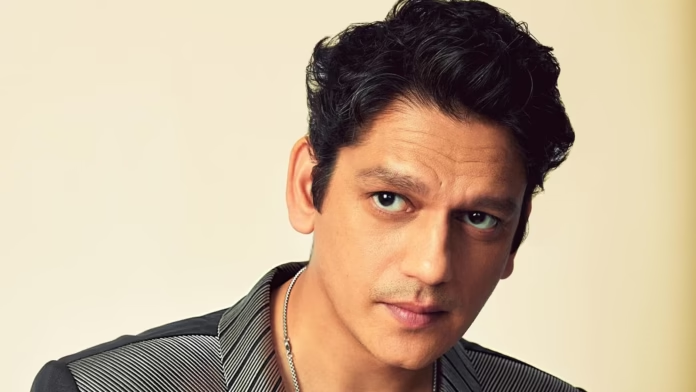Vijay Varma recently shared an unforgettable experience from the sets of Dahaad, where he struggled to remember his lines during a crucial night shoot. The actor, known for his intense performances, found himself blanking out for three hours while the cameras rolled. Despite the pressure, he refused to let frustration take over.
Recalling the moment, Vijay described how his mind stopped working. The scene was significant, and the entire crew was waiting for him to deliver. However, something just didn’t click. He fumbled through his lines and kept losing focus, making it impossible to get the shot right. With multiple cameras rolling and expectations high, tension built up on set. Instead of panicking, Vijay reacted unexpectedly—he laughed.
Rather than beating himself up for the lapse, he embraced the situation. He acknowledged that actors are not machines and that memory lapses are part of the process. He didn’t apologize to the crew or try to justify his struggle. Instead, he accepted that some days are just difficult. His approach helped him regain composure, and eventually, he found his rhythm again.
The experience made him reflect on the unpredictability of performance. Even the most seasoned actors face moments when their minds refuse to cooperate. Vijay recognized that emotions need to be authentic for a scene to work. If they don’t flow naturally, forcing them doesn’t help. His takeaway was simple—actors must allow themselves the freedom to fail.
Memory lapses like the one Vijay experienced are not uncommon in high-pressure situations. Stress, fatigue, and the intensity of a role can all contribute to temporary mental blocks. Scientists suggest that cognitive overload can make it difficult for the brain to retrieve information. When a person is exhausted, the brain prioritizes essential functions over memory recall, leading to sudden blanks.
Actors, in particular, deal with constant emotional shifts, long hours, and immense expectations. Performing a high-stakes scene under bright lights, surrounded by a crew, can heighten stress levels. When exhaustion sets in, the mind struggles to focus, making it harder to recall lines. Vijay’s ability to laugh at himself instead of spiraling into frustration shows a level of self-awareness that helped him break the cycle of anxiety.
His response also highlights an essential lesson in dealing with performance anxiety. Many professionals, whether actors, public speakers, or athletes, face similar moments of self-doubt. The ability to step back, acknowledge the struggle, and not be overly critical can help reset the mind. Vijay’s experience reinforces the idea that failure is part of growth.
After the Dahaad shoot, he reflected on how important it is for actors to be kind to themselves. He believes that every performer faces moments of uncertainty, and accepting them as part of the craft makes a difference. His approach of not forcing emotions but allowing them to come naturally speaks to his evolving understanding of his art.
This incident also sheds light on the human side of acting. While audiences see polished performances, the process behind the scenes is often filled with challenges. Vijay’s honesty about his struggle makes his craft even more relatable. His willingness to talk about the imperfections of acting adds depth to his journey as an artist.
As he moves forward with new projects, Vijay carries this experience as a reminder that perfection is not always possible. His ability to embrace setbacks, learn from them, and continue growing defines his approach to acting. His Dahaad moment may have been difficult, but it also gave him a fresh perspective on his craft.
Vijay also acknowledged that moments like these often go unnoticed by the audience, but they are a crucial part of an actor’s journey. He emphasized that every actor, no matter how experienced, faces such hurdles. The key, he believes, is to not let self-doubt take control. Instead, he views these lapses as opportunities to understand his own creative process better.
Looking back, Vijay realized that the sheer exhaustion from the intense Dahaad schedule might have played a role in his memory lapse. The production demanded long hours, emotionally charged scenes, and continuous mental engagement. His body and mind, pushed to their limits, simply needed a break. This experience reinforced his belief in the importance of rest and recovery for actors.
He also reflected on how different performers cope with such challenges. Some actors prefer solitude, stepping away from the set to regain focus, while others rely on breathing exercises or quick rehearsals to reset their minds. For Vijay, humor became his coping mechanism that night. Instead of resisting the situation, he chose to accept it, making it easier for him to move past the block.
Interestingly, this incident also deepened his understanding of his craft. It reminded him that acting is not just about delivering lines but about being present in the moment. Sometimes, the pressure to perform perfectly can disconnect an actor from the raw emotions needed for a scene. By stepping back and letting go of his self-judgment, he was able to regain his natural flow.
Beyond acting, Vijay sees a parallel between his experience and life in general. He believes that people often place immense pressure on themselves to meet expectations, whether in their careers or personal lives. However, just like in acting, allowing oneself the space to make mistakes and learn from them can lead to personal growth. His Dahaad experience, though challenging, reinforced his commitment to embracing imperfections as a natural part of the journey.



